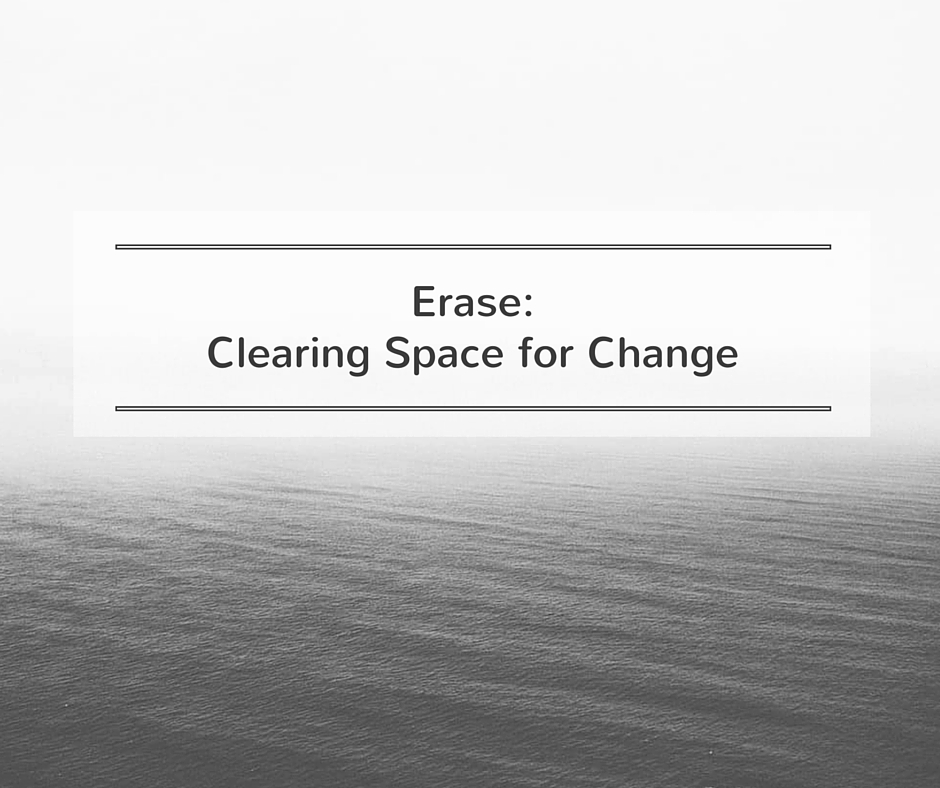
It doesn’t get any easier once the awareness sets in. We often know deep down what’s next—but very few of us like to erase.
The muddled sense of restlessness, the shock from an unexpected event, the suffocating heaviness of stagnancy—these are sorted through in reassessment. After embracing the discomfiting pause in the Reassess stage, we’re faced with a grim decision.
The next step is to erase, clearing space for change.
This phase of REEBO is where many of us freeze in place. What we’re talking about isn’t the changing of an external situation, although that can happen in tandem. It’s an internal processing and release that needs to happen. Without the internal shift, many people change the characters and context but the storyline remains the same.
Perhaps what’s outdated is an old story, assumption, relationship, role, or dream. But at the same time we desire change, we also don’t want to erase the familiar—what has become a part of us. This often feels confusing, and sometimes we jump to convenient conclusions: maybe we don’t need to let go; maybe erasing is the wrong decision if we feel conflicted.
It’s possible that what’s ill-fitting was a foundational part of the past, something that helped you get through a challenging time or grow in another area. It might’ve been useful then, but no longer—and the only way to continue growing is to discard it. Thinking of the ending makes you feel vulnerable, almost like the ground under your feet will crumble away to nothingness.
Erasing can feel like a symbolic death or loss. And in a way, it is. You’re saying goodbye to something that may have worked fine a few years ago but is now a few sizes too small. To erase is to end an old identity so you can embark on a new one.
Death, loss, and endings—we’re typically not big fans of them.
Some people feel lost or incomplete during this time. They feel like they’re breaking off a part of themselves and throwing it away. Others may feel like they’re giving up and starting over at square one.
The important thing to realize is the ending isn’t for forever. The clearing away is necessary before the rebirth of something new.
“Some changes look negative on the surface but you will soon realize that space is being created in your life for something new to emerge.”
– Eckhart Tolle
You need some time as a blank canvas to re-center and recover. In the nothingness, you’re able to uncover any feelings of guilt or blame, erase, grieve, forgive, and move into understanding.
The erasing is what creates space for the exploration to come.
While the experience may be disorientating and nerve-wracking, you need this period of emptiness so you can piece yourself back in a different and better way. Think of it as an internal time-out—a time to take off the weights and note the lightness instead of what’s missing. It’s an opportunity to reinvent and come out stronger.
Many people find it helpful to journal during this time. Writing helps to make sense of the complicated feelings and emotions so you can better understand what’s going on. Getting support from trusted friends, family or professionals is also helpful during this time. Similar to the Reassess phase, you need to slow down and bravely face the process.
But it can feel terrifying to let go, especially when we have no clue what’s to come. People have varying responses to this daunting task.
Some of us run away from the perceived threat. Others feel denial and anger. We attempt to hide, distract and numb, but you can’t undo the awareness. Particularly when we’re aware of what we need to do, the greater the suffering due to inaction. We can get stuck into a perpetual loop between Reassess and stagnancy. Unaddressed, we slide deeper into stagnancy over time, and our happiness, health and sense of self are increasingly impacted.
Some are afraid of the emptiness experienced in the process of letting go. So we grab at what’s conveniently there to make a swap or we don’t spend enough time with the blank canvas before hastily rushing into something we encounter next. In this scenario, the old isn’t erased but still attached—weighing us down while dangling haphazardly in disrepair.
While it can feel terrifying to erase without the assurance of success or improvement, realize you won’t be able to see clearly until you let go.
Only those who have released their hold and ventured forth can see what’s on the other side of the brush.
Erasing involves trusting that the next step will become clear to you as you move forward—maybe not immediately, but that you’ll figure it out with patience, time and the help from supportive people in your life.
Erasing becomes easier the more you do it.
Especially as you embrace the idea of yourself as a constantly evolving human being. Especially as you start seeing life as a constantly shifting entity of choices, beliefs, identities and activities.
Contrary to much of what advertising and society wants us to think, life isn’t about continual accumulation. A significant part of life is about erasing what’s no longer fitting in your life so you can prepare yourself for what follows—the Explore phase of REEBO. We’ll explore further in my upcoming article. 😉